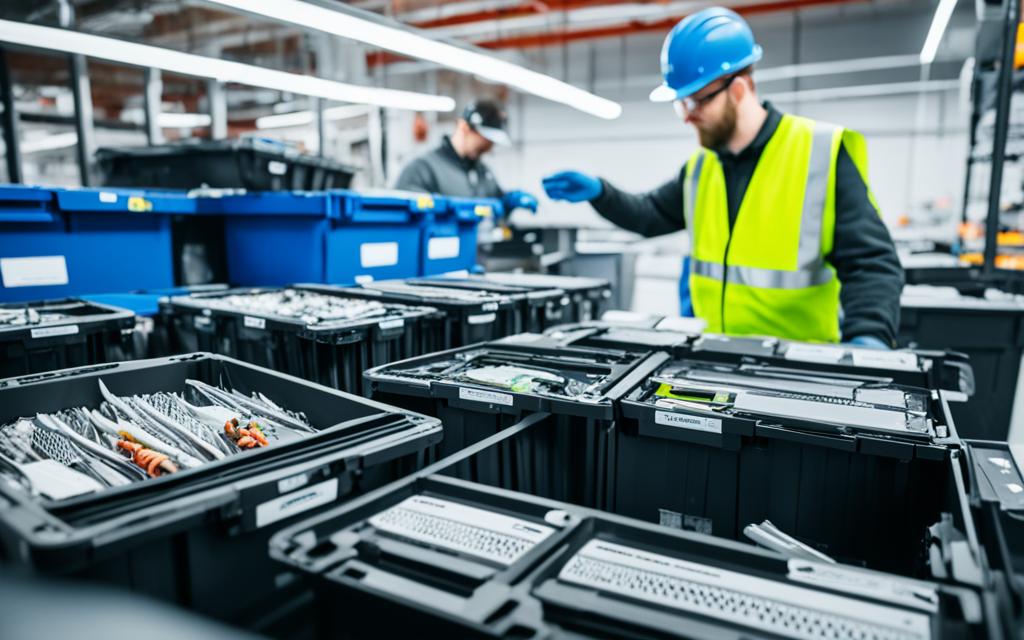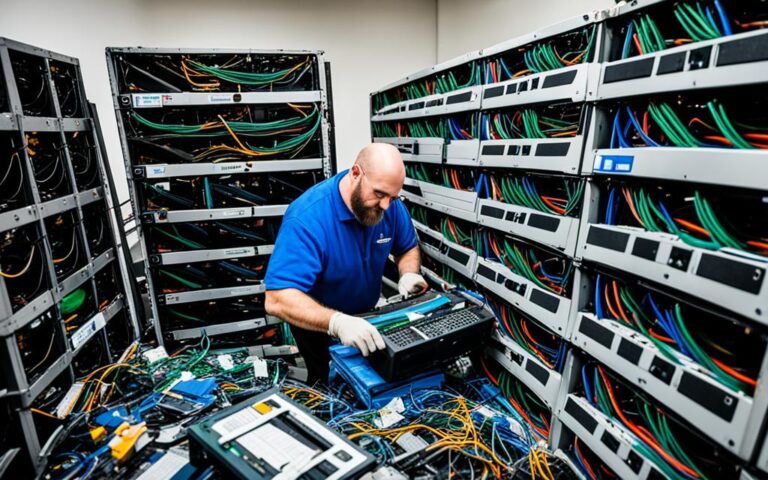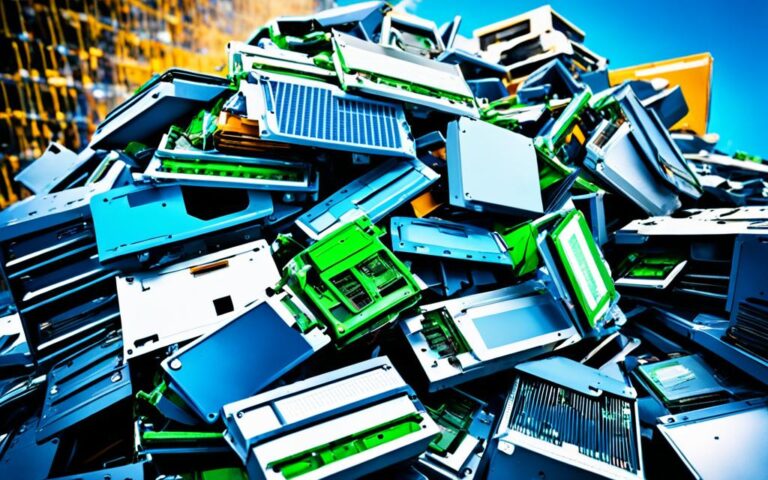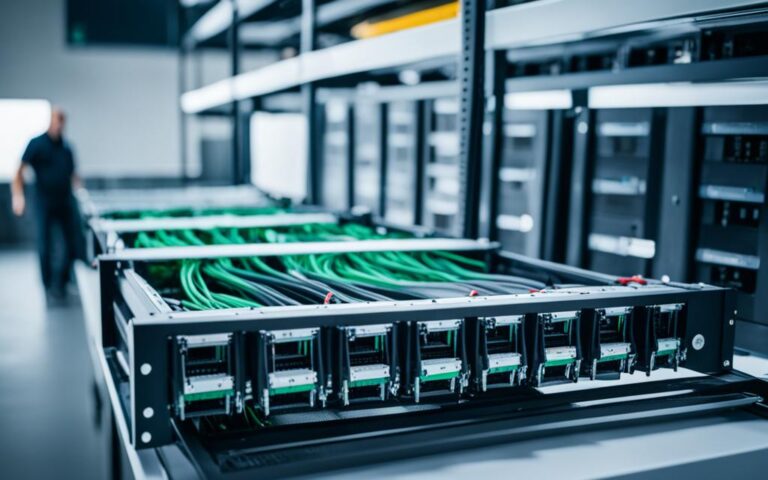How Server Recycling Can Improve Operational Efficiency
Server recycling is not only an environmentally responsible practice but also a strategic approach for improving operational efficiency. By repurposing and recycling outdated servers, businesses can optimize their IT assets, reduce waste, and unlock the potential for higher productivity.
Through the implementation of sustainable server disposal strategies, such as server repurposing and responsible recycling, companies can transform their IT infrastructure, streamline their operations, and enhance their overall efficiency. This article will explore the various ways in which server recycling can lead to operational efficiency improvements and provide guidance on how businesses can integrate server recycling into their sustainability initiatives.
The Impact of Server Waste on Operational Efficiency
The improper disposal of servers and the accumulation of server waste can have detrimental effects on operational efficiency. Servers have short life cycles due to rapid technological advancements, resulting in a continuous stream of outdated equipment. This leads to a waste stream that not only consumes valuable space but also contains valuable materials and toxic substances.
Proper server recycling practices are crucial in mitigating the operational impact of server waste. By recovering valuable materials and preventing the release of toxic substances into the environment, businesses can optimize their resources, reduce operational costs, and create a more sustainable IT infrastructure.
Managing server waste effectively offers several benefits to businesses:
- Resource Optimization: By recycling and repurposing outdated servers, businesses can make the most of their IT assets, extending their use and minimizing waste.
- Cost Reduction: Proper server recycling practices can help reduce operational costs associated with waste disposal, while also cutting down on the need for new equipment purchases.
- Sustainability: By preventing valuable materials from ending up in landfills and reducing the release of toxic substances, businesses contribute to a more sustainable future.
Furthermore, responsible server recycling helps address the growing concern of electronic waste. It is estimated that only 20% of electronic waste is currently recycled, leaving the rest to be either incinerated, stored in landfills, or disposed of improperly. This not only leads to the loss of valuable resources but also poses serious environmental and health risks.
Proper server recycling practices are essential for businesses aiming to optimize their operational efficiency, reduce waste, and protect the environment. By recovering valuable materials and preventing the release of toxic substances, businesses can create a more sustainable future while realizing cost savings.
To illustrate the significance of server waste on operational efficiency, consider the following table:
| Effects of Server Waste on Operational Efficiency | Description |
|---|---|
| 1 | Reduced Physical Space |
| 2 | Loss of Valuable Materials |
| 3 | Environmental Hazards |
| 4 | Increased Operational Costs |
As shown in the table, server waste can result in reduced physical space, the loss of valuable materials, environmental hazards, and increased operational costs. To combat these challenges and improve operational efficiency, businesses must adopt responsible server recycling practices and prioritize the recovery and reuse of valuable resources.
Strategies for Improving Operational Efficiency through Server Recycling
Businesses can achieve significant improvements in operational efficiency through the implementation of strategic server recycling practices. By adopting a holistic approach to server management, companies can optimize their resource utilization, minimize waste and environmental impact, and enhance overall productivity.
Improved Life Cycle Analysis and Specification Development
One key strategy for enhancing operational efficiency is to implement improved life cycle analysis and specification development during server procurement. By conducting a thorough analysis of server life cycles and selecting servers with longer lifespans and improved energy efficiency, businesses can ensure the longevity and sustainability of their IT infrastructure.
Through careful specification development, companies can also identify servers that are easy to upgrade and maintain, reducing the need for frequent replacements. This approach not only saves costs but also minimizes the environmental impact associated with the manufacturing and disposal of new servers.
Reduced Shredding and Increased Dismantling
Avoiding excessive shredding of servers and increasing the dismantling of components can significantly reduce waste and maximize resource utilization. Instead of discarding entire servers, businesses can adopt practices that focus on salvaging and reusing valuable components.
By dismantling servers and extracting reusable components such as memory modules, processors, and hard drives, companies can extend the lifespan of these parts and reduce the demand for new replacements. This approach promotes circularity and resource efficiency, contributing to both environmental sustainability and cost savings.
Trackable Reuse for Enhanced Circular Economy
Implementing a trackable reuse business model enables businesses to keep valuable materials and components within the region, supporting the development of a circular economy. By properly documenting the reuse and redistribution of server components, companies can minimize the need for new resource extraction and production.
This approach not only reduces environmental impact but also offers economic benefits by fostering local collaboration and resource sharing. It enables businesses to tap into the potential of existing materials and components, driving innovation and creating new avenues for sustainable growth.
The Role of Renewable Energy and Energy-Efficient Equipment in Operational Efficiency
Renewable energy sources and energy-efficient equipment are vital for improving operational efficiency, reducing costs, and minimizing the carbon footprint. Transitioning to renewable energy allows businesses to decrease their reliance on fossil fuels while lowering energy expenses. By integrating energy-efficient equipment, such as LED lighting and high-efficiency HVAC systems, companies can further reduce energy consumption and operational costs.
These initiatives not only optimize resource utilization but also align with sustainability goals. By embracing renewable energy and energy-efficient equipment, businesses can achieve long-term cost savings, enhance their operational efficiency, and demonstrate their commitment to environmental responsibility.
| Benefits of Renewable Energy and Energy-Efficient Equipment | Examples |
|---|---|
| Cost Reduction | Lower energy expenses through renewable energy sources and energy-efficient equipment. |
| Minimized Carbon Footprint | Reduced greenhouse gas emissions and environmental impact. |
| Operational Efficiency | Enhanced productivity and streamlined operations through efficient energy use. |
| Sustainability | Alignment with sustainable business practices and goals. |
By adopting renewable energy and energy-efficient equipment, businesses can optimize their resource utilization, reduce operational costs, and contribute to a greener future. Enhancing operational efficiency through sustainable practices is not only beneficial for the environment but also for long-term financial performance and reputation.
In the next section, we will explore strategies for improving operational efficiency through server recycling, further optimizing resource utilization and reducing waste.
Conclusion
Server recycling is a vital element in achieving operational efficiency and sustainability. By repurposing and recycling outdated servers, businesses can optimize their IT assets, reduce waste, and enhance productivity. Moreover, integrating renewable energy sources, energy-efficient equipment, and smart building technologies further contribute to operational efficiency improvements.
Through strategic server recycling practices and a strong commitment to environmental responsibility, businesses have the power to create a more sustainable future while unlocking the potential for higher productivity and cost savings. By embracing server recycling and adopting sustainable practices, businesses can drive operational efficiency and make a positive impact on the environment.
By understanding the importance of resource optimization and environmental responsibility, businesses can actively contribute to sustainability efforts. Server recycling is a practical solution that not only minimizes waste but also helps businesses align with sustainability goals and reduce their carbon footprint. The journey to operational efficiency starts with responsible server recycling, paving the way for a greener and more productive future.
FAQ
What is server recycling?
Server recycling is the process of repurposing or responsibly disposing of outdated servers to optimize IT assets and reduce waste.
How can server recycling improve operational efficiency?
By repurposing or recycling outdated servers, businesses can optimize their IT assets, reduce waste, and unlock the potential for higher productivity.
What are the negative consequences of improper server disposal?
Improper server disposal can negatively impact operational efficiency by creating a waste stream that takes up space and contains valuable and toxic materials.
How can businesses manage server waste effectively?
By implementing proper server recycling practices, businesses can recover valuable materials, prevent toxic substances from being released into the environment, and optimize their resources.
What strategies can businesses adopt to improve operational efficiency through server recycling?
Businesses can implement improved life cycle analysis and specification development during procurement, reduce shredding of servers, increase dismantling and reuse of components, and adopt a trackable reuse business model to maximize resource utilization and minimize waste.
What role does renewable energy play in improving operational efficiency?
Transitioning to renewable energy sources can help businesses reduce their dependence on fossil fuels, lower energy costs, and decrease their carbon footprint, thereby improving operational efficiency.
How can energy-efficient equipment contribute to operational efficiency?
By integrating energy-efficient equipment such as LED lighting and high-efficiency HVAC systems, businesses can further reduce energy consumption, lower operational costs, and optimize resource utilization.
Why is server recycling important for operational efficiency and sustainability?
Server recycling helps businesses optimize their IT assets, reduce waste, and enhance productivity. By embracing sustainable practices, businesses can drive operational efficiency while making a positive impact on the environment.















